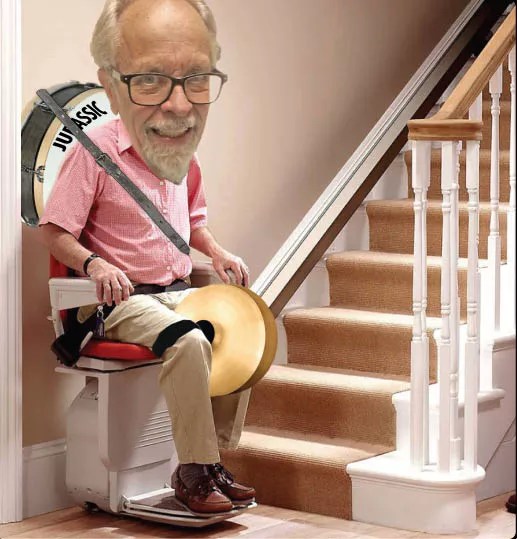
Greg Carr

Audio By Carbonatix
Since moving to Colorado in 1976, Mark Bliesener has worn many hats: drummer; music critic (including a stint at Westword); publicist; manager of Alan Parsons, Lyle Lovett, Big Head Todd and the Monsters and the Nitty Gritty Dirt Band; and Neal Cassady evangelist. But over the past two years, Bliesener’s tolerance and patience for the business part of music has waned, so he decided to record his own material for fun.
“I wanted to just reinvigorate that stuff that originally really got me going,” says Bliesener, who at the age of eight got his first field drum lesson, from a nun. He started playing in bands as a teenager after his family moved from New York to Chicago in 1964. Later that decade, Bliesener got an itch for the Windy City’s garage scene with bands like the Shadows of Knight, the Flock, Saturday’s Children and the Crying Shames.
More than five decades later, Bliesener still has an affinity for the simplicity, sparseness and lack of pretension of garage rock.
“I’m kind of a regressed individual, I guess,” he says. “I just have never quite gotten beyond the garage, because I love the garage.”
His love of garage rock is evident on Jurassic Mark, which he’ll release on CD and streaming services on September 24. While he sings and plays drums, guitar and percussion on the album, he got some help from Gregory Hill (the Babysitters, Manotaur), Eddie Turner (Zephyr, Otis Taylor), Bob Ferbrache (Slim Cessna’s Auto Club, Soul Merchants) and Ernie Martinez (Tom Paxton, John McEuen).
Bliesener says he was hesitant to release the tracks, but his friends kept telling him he should do something with them.
“I said, ‘No, that’s the antithesis of what I’m doing here. I’m doing this strictly for pleasure,'” he recalls.
But with his seventieth birthday approaching later this year, Bliesener finally gave in and began going through 34 songs he’d recorded over the past two years at Hill’s Sparky the Dog studio; some of the lyrics deal with the process of aging.
“I was playing some stuff for a much younger guy, in his mid-twenties,” Bliesener says. “He was going, ‘That’s cool. You’ve got this retro sound going. You’re really trying to get that retro thing.’ I said, ‘No, this is just what I do. My instruments are antiques at this point.'”
Bliesener kicks off the album with “Young Man’s Mind,” which has the swagger of David Bowie’s “Jean Genie.” That’s followed by a cover of the Flying Burrito Brothers’ “Older Guys,” which he gives more of a T. Rex “Bang a Gong” feel. And while he used garage rock as a template on some of the cuts, he also added Phil Spector-like embellishments on songs such as “Window” and “Low Tide.”
“Continental Divide” includes Ferbrache, who now lives in Vermont, on keyboards, bass and lead guitar. The song flashes back to Bliesener’s days as a manager and dealing with band breakups.
“There’s a line in there – ‘The chamber’s only fully loaded when it revolves around you,'” Bliesener says. “That was always the situation in bands back in my formative years. I learned so much about negotiating with people and dealing with egos and stuff that served me so well later on.”
“Stoned on the Drums” is about Bliesener’s younger days, when he was first playing in bands. One of those groups was Humpback Whale, in the early ’70s in Chicago; that was before he moved to Los Angeles and, through a friend, landed a drumming gig with the certifiably garage-y Question Mark and the Mysterians.
Not long after Bliesener relocated to Colorado, he hung up his drumsticks, thinking he wasn’t going to make a living playing music, because it was a dead end for him at that point. So he taught a class on rock-and-roll history at the Free School in Boulder, and later got hired as associate editor at the Boulder-based Rocky Mountain Musical Express, where one full-page ad from a record company paid the staff’s salary for a month.
“That was a nice, fun gig to have when the Ramones, Talking Heads, Mink DeVille, Blondie and DEVO were just breaking,” he recalls.
During Bliesener’s editing run, the former giant of Denver promoters, Barry Fey, asked him to be his publicist, which he did for nearly eight years before setting out on his own to handle publicity for acts like local bluegrass act Hot Rize, blues guitarist Lonnie Mack and the Nitty Gritty Dirt Band. After that, Bliesener began managing bands.
According to him, his success in the music industry had a lot to do with being at the right place at the right time. He was fourteen when the Beatles made it big, seventeen during the Summer of Love, and 25 when punk hit. He learned a lot as a musician, and parlayed that into a series of desk jobs.
“When the bloom and joy of being a traveling musician was wearing off, I suddenly discovered I learned something over the years aside from how to have fights with club owners at two in the morning and how to pack everything in the van,” he says. “I taught at UCD for a while, co-authored a book. I got to do a lot of stuff with this knowledge, which I got by doing it, which is lucky. If I’d been born ten years later or ten years earlier, it probably wouldn’t have happened that way.
“When I get philosophical about it and I think, well, what if I was turning sixty or something, I think, Jesus, what I would have missed,” he says. “I wouldn’t want to give any of that up. It really served. Turning seventy feels pretty good, but then, I’ve been very lucky – just by the accident of my birth – to be able to take advantage of the rock-and-roll slipstream and do what I wanted to do.”